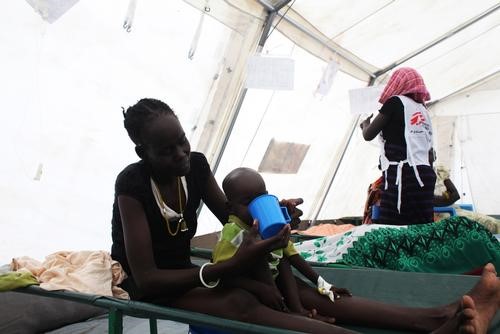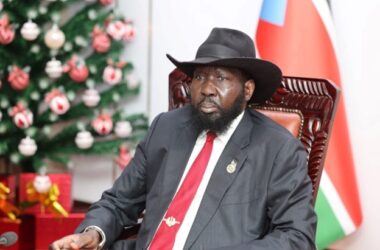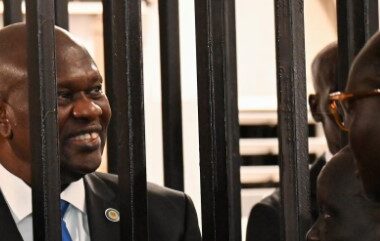By Philip Buda Ladu
At least five children suffering from cholera in South Sudan have tragically died while attempting to reach medical care.
This followed cuts to foreign aid, forced the closure of vital local health clinics amidst a significant outbreak of the deadly disease, Save the Children reported on Wednesday.
According to Medicine San Frontiers (MSF), the devastating situation unfolded in a remote area of Akobo County, Jonglei State in the eastern part of the country.
The children, along with three adults, succumbed to the arduous three-hour trek from their village to the nearest functioning health facility in Akobo town. The group endured scorching temperatures reaching 40 degrees Celsius without access to clean water, shade, or essential medicines.
Prior to this year’s aid reductions, these children and adults would have had access to potentially life-saving treatment at one of the 27 health facilities established and supported by Save the Children. These clinics provided crucial free healthcare for conditions including malnutrition and cholera.
However, the cuts to foreign aid have had a catastrophic impact, forcing the complete closure of seven of these health facilities, with the remaining 20 operating with reduced capacity.
Some centers are now reliant solely on volunteers, and critically, transportation for severely ill individuals to the hospital in Akobo town is no longer available.
The cholera outbreak in Akobo County has been escalating since mid-February, fueled by abnormally heavy rains and subsequent flooding. Alarmingly, children aged 17 and under account for 44% of the reported cholera cases.
The floods have also ravaged crops, exacerbating the already critical levels of food insecurity and malnutrition in Akobo County, which Save the Children describes as some of the worst in the nation.
Staff on the ground report that half the children they are seeing in the remaining clinics are suffering from malnutrition, a condition that severely weakens immune systems and increases vulnerability to diseases like cholera.
Adding to the crisis, the region has been affected by a nationally escalating security situation, including recent airstrikes in Akobo County.
These rising tensions threaten to plunge the country back into widespread conflict, seven years after a landmark peace agreement, further jeopardizing humanitarian access in a country where a staggering 78% of the population is in need of aid.
In the limited clinics where Save the Children can still operate, the organization is supporting cholera treatment units and providing essential infection prevention and control measures, as well as water, sanitation, hygiene supplies, and awareness campaigns.
For many in Akobo County, access to treatment is now severely restricted. Faced with dwindling supplies of oral rehydration sachets, typically used for mild cases, those unable to reach the functioning clinics are resorting to traditional remedies, such as consuming local herbs.
Sarah*, a 24-year-old cholera patient from a remote community, recounted her ordeal: “I am sick. My stomach is in pain and I cannot move. They said I can go to hospital in town, but I am weak and it is far. The doctor is helping his people for free. When Save the Children left, we had no hope, this doctor is only helping and sending us to Akobo to receive medicines.”
She added poignantly, “We used to be happy – there were many doctors and enough medicine. We did not suffer much. But we are now suffering. Sick people are being carried to hospital because they cannot walk for many hours.”
Michael, a community health worker volunteering at a local facility, painted a grim picture:
“Since the cuts, the community is really suffering; we don’t have good medications. Before we had all medications for various diseases, and patients were treated on time; now we have no choice. We see patients suffering, and we can’t help. We can only refer, knowing that it’s difficult for some patients to reach the hospital in town in time to be helped since it is almost three hours of walking.”
He emphasized the dire situation with the cholera outbreak saying: “Now there is a serious cholera outbreak. We don’t have any medications apart from Oral Rehydration Salt (ORS), which is very limited; we only give one sachet per patient.”
Chris Nyamandi, Save the Children Country Director in South Sudan, expressed outrage at the tragic consequences of aid cuts.
“There should be global moral outrage that the decisions made by powerful people in other countries have led to child deaths in just a matter of weeks.”
He urgently called for international attention to the unfolding humanitarian catastrophe.
“It is critical that the world wakes up to the humanitarian catastrophe unfolding in South Sudan – a country where four out of five people need aid to survive. We must do everything in our power to prevent such deaths happening again. The first step is to make sure the current tensions in the country do not escalate further”.
“Children and families in South Sudan need peace and stability that will allow Save the Children and other aid groups to rise to this emerging challenge, adapt to the new global reality and do our utmost to put children’s needs first – to ensure this travesty does not happen again she added”
Save the Children has been working in South Sudan since 1991, providing essential education, healthcare, nutritional support, and food security assistance to children and families.
The organization highlights South Sudan’s vulnerability to climate change impacts, with nearly a year of severe rains and flooding displacing at least 379,000 people and fueling the spread of cholera and other waterborne diseases.




